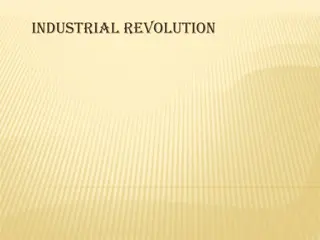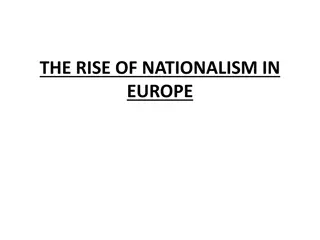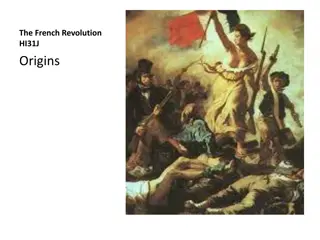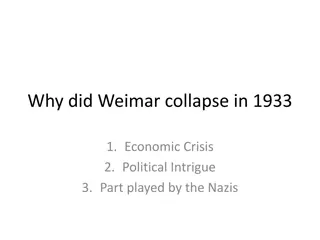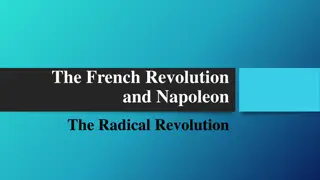Causes of the French Revolution and Economic Factors Leading to Unrest
The French Revolution was fueled by a combination of political, social, and economic factors. Political causes included royal incompetence, denial of voice in government, and unpopular monarchs like King Louis XVI and Marie Antoinette. Social causes stemmed from the vast inequality among the three estates, with the Third Estate comprising mostly peasants who faced significant disadvantages. Economic factors revolved around heavy spending by the monarchy, refusal to tax the privileged classes, burdensome taxes on the peasantry, and the ignoring of economic advice to address financial issues. These factors collectively contributed to the unrest that eventually led to the French Revolution.
Download Presentation

Please find below an Image/Link to download the presentation.
The content on the website is provided AS IS for your information and personal use only. It may not be sold, licensed, or shared on other websites without obtaining consent from the author. Download presentation by click this link. If you encounter any issues during the download, it is possible that the publisher has removed the file from their server.
E N D
Presentation Transcript
Unit 4 The French Revolution and Napoleon
Political Causes King was divine right monarch People were denied voice in government Louis XVI incompetent Dull mind No leadership qualities Marie Antoinette unpopular Austrian Hapsburg Vain, frivolous person
Social Causes- 3 Estates First Clergy 1.5% Second Nobility 1.5% Third Bourgeoisie Merchants Bankers Attorneys City workers Peasants 97%
Social Causes- 1st & 2nd Estates Owned most land Collected feudal dues (banalites) Were exempt from most taxes Held best government/military jobs Received special legal treatment Did include some poor parish priests
Social Causes 3rd Estate (Bourgeoisie) Most powerful group on continent Wealthy and well-educated Resented arrogance of nobles Wanted role in shaping governmental policies Wanted to end mercantilism, preferring laissez- faire Ideas presented by economist Adam Smith Wealth of Nations (1776)
Social Causes- 3rd Estate Third Estate (whether bourgeoisie or peasants) was unprivileged class
Economic Causes Spending Louis XVI Spent heavily to aid American colonists against Britain Maintained lavish court at Versailles Refused to tax privileged classes
Economic Causes-Taxes Peasants of income=taxes To government Taille (land tax) Corvee (forced labor) Gabelle (tax on salt purchases) To Church--tithe To lords banalites Bourgeoisie Provincial tariffs on trade Guild restrictions on manufacturing Government mercantilistic regulations
Economic Causes Ignored Advice He ignored economic advice to: End court extravagances Tax the nobility Louis heeded his nobles and dismissed economic advisors
Ideological Causes French Philosophes Challenged traditional thinking and institutions Vision
Ideological Causes Other Revolutions England--Puritan Revolution and Glorious Revolution Geographically close English took refuge in France French philosophes praised English parliamentary government
Ideological Causes Other Revolutions American Revolution Lafayette and other French involved Franklin and Jefferson were popular American envoys to France




